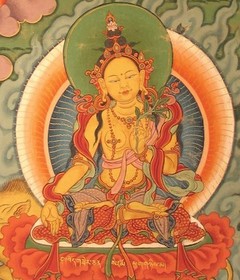Mārīcī Sādhana
Jamyang Khyentse composed this simple sādhana of the radiant goddess Mārīcī at the request of the cabinet minister Lukhangpa Tsewang Rabten (1895–1966).
༄༅། །འོད་ཟེར་ཅན་མའི་སྒྲུབ་ཐབས།
A Sādhana of Mārīcī1
by Jamyang Khyentse Chökyi Lodrö
སངས་རྒྱས་ཆོས་དང་ཚོགས་ཀྱི་མཆོག་རྣམས་ལ། །
sangye chö dang tsok kyi chok nam la
In the Buddha, the Dharma and the Supreme Assembly
བྱང་ཆུབ་བར་དུ་བདག་ནི་སྐྱབས་སུ་མཆི། །
changchub bardu dak ni kyab su chi
I take refuge until I attain enlightenment.
བདག་གི་སྦྱིན་སོགས་བགྱིས་པའི་བསོད་ནམས་ཀྱིས། །
dak gi jin sok gyipé sönam kyi
Through the merit of practising generosity and so on,
འགྲོ་ལ་ཕན་ཕྱིར་སངས་རྒྱས་འགྲུབ་པར་ཤོག །
dro la pen chir sangye drubpar shok
May I attain buddhahood for the benefit of all beings.
ཚར་གསུམ།
Repeat this verse three times.
Main Part
སྟོང་པའི་ངང་ལས་སྐད་ཅིག་གིས།
tongpé ngang lé kechik gi
Instantaneously, out of the state of emptiness,
ཕག་སེར་མོ་བཞིས་དྲངས་པའི་ཤིང་རྟའི་སྟེང་། །
pak sermo shyi drangpé shingté teng
Upon a chariot drawn by four [golden] sows,
པདྨ་ཟླ་བའི་དལ་གྱི་དབུས།
pema dawé dal gyi ü
In the heart of a lotus and moon disc,
མཱྃཿལས་འོད་ཟེར་ཅན་མ་ནི། །
mam lé özer chen ma ni
Arises Mārīcī out of the syllable Māṃ.
གསེར་མདོག་རིན་ཆེན་རྒྱན་ཆ་དང་། །
ser dok rinchen gyencha dang
She is golden in colour, wears jewel ornaments,
དར་གྱི་སྟོད་གཡོག་སྨད་ཤམས་མཛེས། །
dar gyi tö yok mé sham dzé
And is clothed in upper and lower garments of silk.
ཕྱག་གཡས་མཆོག་སྦྱིན་མྱ་ངན་མེད། །
Her right hand is in the gesture of supreme giving
ཤིང་གི་ཡལ་ག་བསྣམས་པ་དང་། །
And holds the branch of an aśoka plant,
གཡོན་པས་ཁབ་དང་སྐུད་པ་འཛིན། །
While her left hand holds a needle and thread.
གསལ་བའི་ཐུགས་ནས་རང་འདྲ་ནི། །
salwé tuk né rang dra ni
From her radiant heart centre she emanates
དཔག་མེད་འཕྲོས་པས་དགྲ་གདོན་བགེགས། །
Countless forms, identical to herself,
གཟུགས་ཅན་གཟུགས་མེད་གནོད་པ་རྣམས། །
zukchen zukmé nöpa nam
Who utterly annihilate enemies, negative influences, obstacle-makers,
མིང་ཙམ་མེད་པར་བརླག་པར་བསམ། །
ming tsam mepar lakpar gyur
And harmdoers—material and immaterial—so that not even their names remain.
ཨོཾ་མ་རཱི་ཙྱཻ་མཱུཾཿསྭཱ་ཧཱ།
om maritsyai mum soha
ཅི་ནུས་བཟླས་མཐར།
Recite the mantra as many times as possible.
Conclusion
Then conclude with:
དགེ་བ་འདི་ཡིས་མྱུར་དུ་བདག །
gewa di yi nyurdu dak
Through the merit of this, may I swiftly
འོད་ཟེར་ཅན་མ་འགྲུབ་གྱུར་ནས། །
özer chen ma drub gyur né
Attain the realization of Mārīcī,
འགྲོ་བ་གཅིག་ཀྱང་མ་ལུས་པ། །
drowa chik kyang malüpa
And thereby may every single sentient being
དེ་ཡི་ས་ལ་འགོད་པར་ཤོག །
dé yi sa la göpar shok
Reach this state of perfection too.
ཅེས་སྲིད་བློན་བདེ་མཁར་བས་བསྐུལ་ངོར། འཇམ་དབྱངས་ཆོས་ཀྱི་བློ་གྲོས་པས་བྲིས་པ་དགེ་ལེགས་འཕེལ།། །།
Jamyang Chökyi Lodrö wrote this in response to a request from the prime minister Dekhar.2 May virtue and excellence increase!
| Translated by Adam Pearcey with the generous support of the Khyentse Foundation and Tertön Sogyal Trust, 2021.
Source: 'Jam dbyangs chos kyi blo gros. ’Jam dbyangs chos kyi blo gros kyi gsung ’bum. 12 vols. Bir: Khyentse Labrang, 2012. W1KG12986 Vol. 7: 284
↑ Title added by the translator; the original is untitled.
↑ I.e., Lukhangpa Tsewang Rabten (1895–1966).
Source
[[1]]
